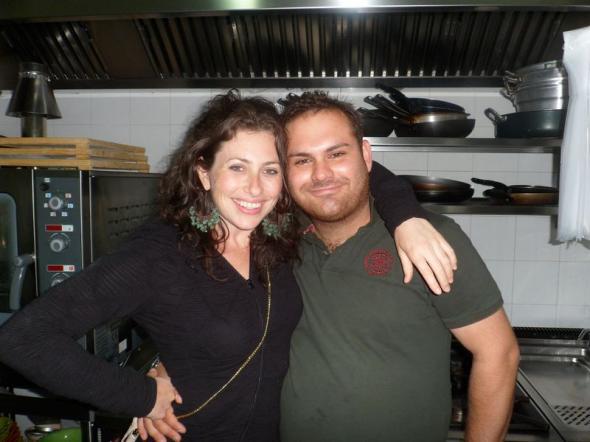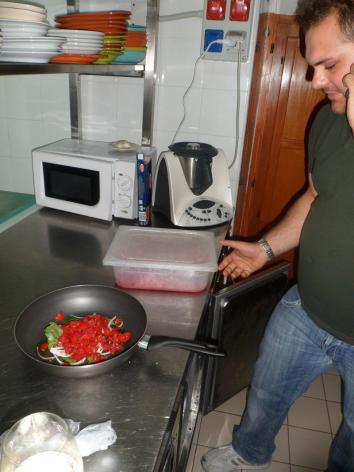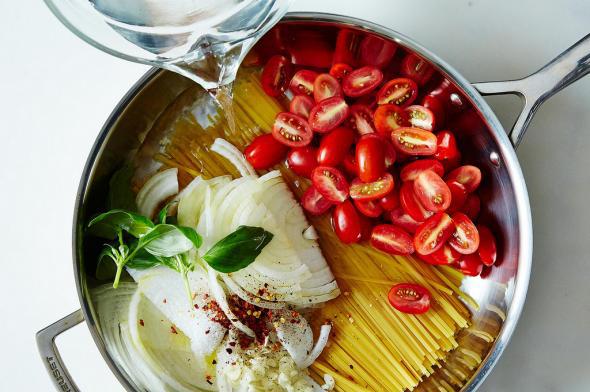This post originally appeared on Food52.
This genius pasta makes its own sauce, all in one pan, in nine minutes—you’ve probably already cooked it (or at least thought about it). After Martha Stewart Living magazine published the recipe in June 2013, it splashed all over the Internet (including right here, sploosh), and got a lot of people out of their weeknight cooking ruts. It meant that cooking pasta no longer had to start with waiting for a big pot of water to boil, or end with trying to meld plain noodles with a cohesive sauce. One pan. Nine minutes.
The magazine had precious little space to detail the recipe’s origins—explaining simply that an editor had picked up the tip in Puglia. But there’s nothing to stop me from giving you the full scoop. So where did the recipe really come from? How did the minds behind Living come to abandon all the rules of proper pasta cookery? And are there more ways we can do it?
Like lots of recipes, before this one was published in a magazine, it was tasted and honed in a test kitchen, and before that pitched, and before that sparked from somewhere. This particular somewhere just happened to be the back of a restaurant in a tiny town in Italy, a few glasses of wine deep.
When I met the recipe’s developer Nora Singley for coffee to hear the story, she handed over a memory card full of photos from her trip, which she couldn’t get to open on her computer at home. They magically loaded on my laptop, and the details started coming faster.

Photo courtesy of Nora Singley
In 2011, Singley—a longtime TV chef, recipe developer, and food stylist for Martha Stewart—was visiting a small former fishing village called Peschici in the north of Puglia, approximately where the spur would be on the boot that is Italy (Zahra Tangorra, the chef-owner of Brucie and a former guest on The Martha Stewart Show, had urged Singley to go there).
One night, Singley and her Martha colleague Sarah Mastracco stumbled into a local restaurant and their server Matteo Martella (who was also the cook and owner’s son), started telling the two about the speedy way his mom cooked pasta. “I was thinking, ‘What do you mean all in one pot?’” Singley told me. “We were aghast. Sarah and I, with all our years of cooking experience—it just completely belied our formal training.”
He took them back into the kitchen to prove it, piling everything—tomatoes, onions, dry spaghetti, basil, salt, and a small amount of water—into a very small skillet. (As you can see from the photos, he did this so casually that he was able to talk on the phone at the same time.)

Photo courtesy of Nora Singley
About nine minutes later, they were eating pasta, the unofficial last course of the night. “It was perfect—and perfectly starchy,” in the same way that restaurants have a leg up on us with the creaminess and emulsifying power of extra-concentrated, extra-starchy pasta cooking water, Singley told me. “And it was this beautiful moment of learning.”
Back home in New York, Singley developed the technique into a complete recipe and made it for Martha herself, who was vetting recipes for her TV show.
The recipe didn’t make it on the show at the time, but its next stop was at Living, where Singley offered it up for a developing pasta story. Executive food director Lucinda Scala Quinn loved it so much that she turned it into its own feature. The Internet went wild. Three people sent it to me for Genius Recipes, and by the following summer, I’d shared it with all of you.
“I think it’s such an awesome template—you can take it away and do it with anything,” Singley later wrote to me. So I asked her to share the ways she’d suggest spinning off of this technique with other ingredients, and she sent me the seven below. These are meant to be triggers for your own inspiration and haven’t been tested and honed yet—that’s the next chapter. Tell us the ones that excite you most (or your own variations!) and we might just test and turn them into a full-fledged genius recipe.
Seven New Visions for One-Pan Pasta from Nora Singley
- Orecchiette with sausage and broccoli rabe: Brown the sausage first, then add the rest of the ingredients: pasta, water, broccoli rabe, olive oil, salt and pepper, red pepper flakes. Finish with Parmigiano-Reggiano.
- Rotelle (or cavatelli, or mini conchiglie) with corn, shallots, lemon zest, butter, salt and pepper. Finish with mascarpone, tarragon, and basil.
- Spaghetti alle vongole: Start with spaghetti, garlic, chopped fresh chiles, olive oil, salt and pepper, sprigs of parsley (remove them later, as with basil in the original recipe). Add clams a few minutes before the end of cooking, then finish with chopped parsley, lemon juice, and additional olive oil.
- Rigatoni (or rigatoni corti, or casarecci), balsamic vinegar, capers, olive oil, eggplant, garlic, salt, and pepper. Finish with mozzarella or ricotta salata, toasted pine nuts, parsley, and Parmesan.
- Cacio e Pepe: Pasta, water, salt, and cracked black pepper, and grated Pecorino. Some would add butter, too. Finish with additional Pecorino.
- Bolognese: Brown off the meat first, then add wine to deglaze and the rest of ingredients—carrots, onions, and celery (all minced super finely in a food processor), sprigs of thyme, bay leaf, a can of tomatoes (or keep it white and add milk), salt and pepper, a Parmesan rind.
- Miso ramen with ramen noodles or soba. Dried shiitakes, ginger, garlic, miso, scallions, napa cabbage, and crack an egg into it at the last two minutes; finish with sesame oil, toasted sesame seeds, and fresh scallions or cilantro. If you reduce the cooking liquid as with the others, this would be a dry ramen, a mazeman style.
Note that cooking times and liquid amounts will vary with the pasta shapes, bonus ingredients, and pans you use, so it’s better to err on the side of too little liquid at first, then add more as needed to finish cooking the pasta. Look to the original recipe for guidance and pasta box for cook times, flex those not-recipe muscles, and have fun—then report back to us!
Got a genius recipe to share—from a classic cookbook, an online source, or anywhere, really? Please send it my way (and tell me what’s so smart about it) at kristen@food52.com. Want to know the origin of another Genius Recipe? I want to hear that too!
More from Food52:
The Genius Eight-Minute Summer Side Dish
Martha Stewart’s One-Pan Pasta
14 Ways to Give Your Rice or Pasta Dregs New Life
The Five Pastas You Should Always Have in Your Pantry
Mario Batali’s Six Essential Tools for Cooking Pasta
Martha Stewart’s Slab Pie
